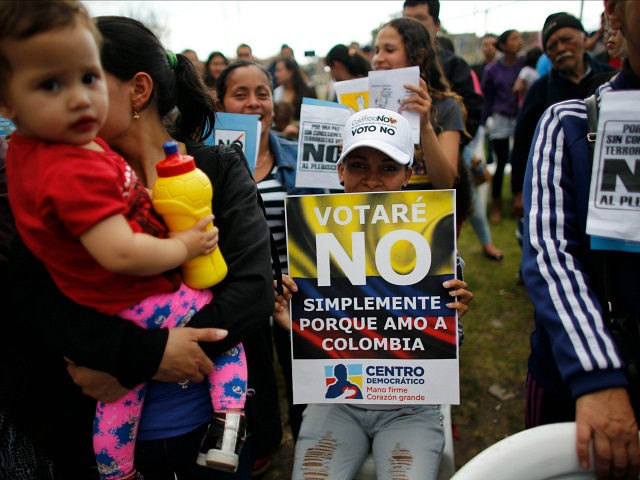Colombian President Juan Manuel Santos has announced the conclusion of a new “peace deal” with the Revolutionary Armed Forces of Colombia (FARC), a Marxist terrorist group. This agreement appears to be designed to avoid a national referendum and thus another round of humiliation if the people reject it again.
The 310-page-long document released this weekend features items that make the deal function more like a bill than a treaty, and, as such, Santos is expected to present it to Congress as legislation. The BBC notes that one major concession the FARC terrorist group ceded to was to hand over a full inventory of its assets, including millions in drug trafficking profits and ransoms from half a century of abductions.
Little else in the full text of the deal appears to address the concerns of the Colombian people regarding the potential for impunity or the national rejection of impunity for those who have committed acts of terrorism. The drafters organized the deal into six sections:
- “Integral Rural Reform,” a section that includes new measures to promote “gender equality” and environmentalism
- Democratic reform: a segment which guarantees the terrorist group representation in the Colombian government
- “Ceasefire… and Weapons Abandonment,” which sets the logistical provisions for terrorists to be reintegrated in society and differs little from the original deal. “Demobilized” terrorists will receive a monthly government stipend to live.
- Drug reform: “promoting a new vision for a distinct and differentiated treatment of the phenomenon of [drug] consumption, the problem of cultivation of illict drugs, and criminality associated with drug trafficking”
- “Victims,” the segment creating a special tribunal for FARC criminals
- “Mechanisms of Integration and Verification,” creating a new meta-bureaucracy to control the aforementioned new bureaucratic structures
Reuters notes that the new deal “appears to make only small modifications to the original text.” FARC terrorists will still avoid prison time and have the ability to use their drug assets to run for office. The government will now know, however, how much money they have in their coffers for their political experiment.
The new FARC deal praises the mediating countries of communist Cuba and the kingdom of Norway, as well as leftist leaders in Venezuela and Chile for promoting negotiations. The document also reaffirms the human rights of LGBTI individuals but does not explain what relationship the statement has with the rest of the document.
The FARC is believed to be responsible for at least 200,000 deaths and 100,000 disappearances during its existence, as well as a variety of major human rights violations such as abductions for ransom, the use of land mines in civilian communities, the use of child soldiers, child rape, and forced abortions on underaged female child soldiers.
In October, President Santos put the deal between Bogotá and the FARC to a national vote, as the Colombian constitution demands. “No” won the vote with barely over 50 percent of the vote, though maps of voter distribution clearly showed rural areas affected by FARC terrorism significantly more likely to vote “No” than those in coastal, urban communities isolated from the terrorist violence. The vote was a major embarrassment to Santos, who had taken two victory laps before the UN General Assembly beforehand and won the Nobel Peace Prize for his efforts.
Opponents of the deal argue that FARC terrorists who have committed gross violations of human rights should not be granted amnesty, nor should they be allowed to organize a political party around their values, using their ill-gained loot to fund campaigns. Álvaro Uribe, the senator and former president leading the “No” campaign, has issued a new statement demanding that the victims of FARC terrorism be granted a stronger voice.
Pedí al Pte Santos q textos q anuncian de La Habana no tengan alcance definitivo. Sean puestos en conocimiento de voceros del No y víctimas pic.twitter.com/smj5OdjgQ0
— Álvaro Uribe Vélez (@AlvaroUribeVel) November 12, 2016
“It is necessary for a national agreement on peace to include the institutions of justice,” Uribe — a vocal opponent of special FARC tribunals — said.

COMMENTS
Please let us know if you're having issues with commenting.